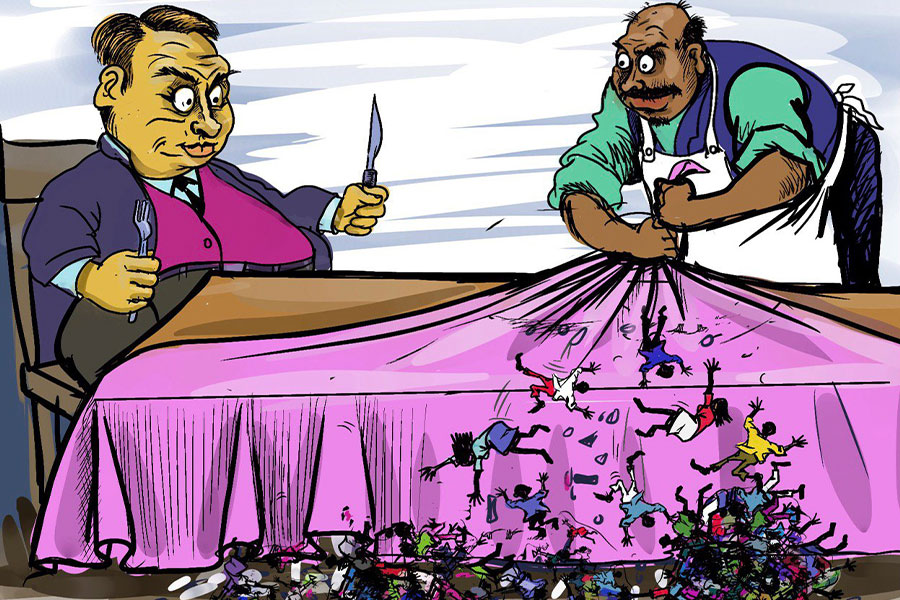
My Opinion | 130195 Views | Aug 14,2021
May 31 , 2025. By YITBAREK GETACHEW ( FORTUNE STAFF WRITER )
Addis Abeba is racing to build a public charging network for electric cars estimated to reach 100,000, but the rollout has already hit a wall. The plugs are installed,but the power is not.
The Traffic Management Authority is wiring every “smart” parking lot for chargers, starting with Women’s Square, Casanchis and Bole-Japan neighbourhoods, disclosed Binyam Getachew, director of Parking Traffic Infrastructure Management.
Crews lay cable and mount the units, yet some sites still wait for the transformers that will feed them.
Master Trading Plc, contracted to fit chargers at Bole-Japan, bolted two 120-volt units to the ground weeks ago. They can fast-charge four cars at once.
“We built the system,” said Abdulselam Jirga, the company’s general manager. “But, we’re waiting to receive the power.”
The firm paid 251,000 Br in customs duty “excluding the price of the equipment,” he said. Now, he needs to start earning revenue.
Under city rules, the Traffic Management Authority, not the contractor, should apply for electricity. The paperwork begins at district offices, proceeds through the city development bureau, and is then submitted to the Ethiopian Electric Utility (EEU) or the Ethiopian Electric Power (EEP)depending on power requirements, which determines the transformer size and reports back to the Authority.
“Given the large investment required, the feasibility of each site is thoroughly assessed before proceeding,” Binyam told Fortune.
City officials want private investors to run parking and charging in a public-private partnership meant to serve both motorists and transit fleets.
“You can park for two purposes,” said Yabibal Addis, head of the City Transport Bureau. “One for parking, and one for charging.”
He lists three steps for every location: import the hardware, secure a dedicated transformer, and prepare the bays.
“Work is advancing," he said, “but further work is required to meet the growing demand.”
However, standards have not kept pace with the changes. Last September, the Institute of Ethiopian Standards set minimum battery life and capacity for electric cars, a move hailed as a milestone. Yet, it left out charger specifications, freezing multimillion-Birr projects. Without clear technical rules, banks and investors are reluctant to finance new plugs, say industry executives.
U Street Parking Plc recently took over 22 public lots, including high-traffic hubs such as the CMC roundabout, which accommodates approximately 485 cars, as well as 4 Kilo, Rwanda Bridge, and near Century Mall. Deputy Manager Biniyam Alemu disclosed that the company has filed detailed blueprints for each site to keep the rollout uniform.
It imported chargers “for two purposes: self-installation and commercial sale,” but high capital costs slow adoption. Today, only two charging points are live, both at Signature Residence on Cameron Street.
Customs adds to the bill.
“The duties are a heavy burden for us, even more so than the initial purchase price of the machines,” Biniyam told Fortune.
Profit, he hopes, arrives only after years of operation, and even then, it depends on reliable power and routine maintenance. Hardware prices are steep.
Levels Technology Plc, which supplies chargers to diplomats and other high-profile clients, quotes two million to three million Birr for an advanced European model with a “double-gun” design. Complete installation runs between 4.8 million and 5.8 million Br and promises a 15- to 45-minute charging time, disclosed the General Manager, Abdissa Gizachew.
“Power disruptions can affect the performance of charging stations,” he warned. “Our customers sometimes experience power disruptions.”
Sudden outages can also damage the electronics, raising insurance and repair costs.
The city has also begun with its fleet. One hundred “velocity” electric buses now recharge at the municipal bus station; officials plan to establish a dedicated depot near the Goro area once the imports clear customs. Yabibal disclosed that shipping delays have slowed the schedule.
For executives of the EEP, the generation arm, capacity is not the problem. They anticipate that the Grand Ethiopian Renaissance Dam (GERD) is nearing completion, and supply is “at the desired level,” according to Hiwot Eshetu, general manager for corporate planning.
Still, new feeders and network upgrades are needed.
“Even though we’ve sufficient power supply, there are some things that need to be done,” he told Fortune.
EEP and Ethiopian Electric Utility both allow customers to buy or finance transformers “according to their needs,” he said. EEP also plans to enter the market directly.
“We’ll build the stations amass,” Hiwot said. “Anyone can use them by paying their fees.”
A cabinet-level task force is drafting a national electric vehicle strategy, starting with priority corridors and parking lots. Analysts say accurate forecasts of charger demand are critical; placing too few results in queues, while placing too many leads to equipment sitting idle.
Yemanebrhan Kiros, manager at energy consultancy Yomener Energy, worries about what happens when several cars fast-charge at once on a feeder designed decades ago.
He warns households and businesses alike to understand their power consumption to avoid overloading the system.
“Fast charging is not always advisable,” he told Fortune.
He argues that solar-powered stations could steady voltage, cut fuel imports, and curb pollution. Ethiopia’s green-legacy plan envisions millions of trees and more renewable power, yet the grid was not built with car chargers in mind. According to Yemanebrhan, without upgrades, the growing fleet could lead to power shortages.
PUBLISHED ON
May 31,2025 [ VOL
26 , NO
1309]

My Opinion | 130195 Views | Aug 14,2021

My Opinion | 126496 Views | Aug 21,2021

My Opinion | 124501 Views | Sep 10,2021

My Opinion | 122257 Views | Aug 07,2021

May 31 , 2025
It is seldom flattering to be bracketed with North Korea and Myanmar. Ironically, Eth...

May 24 , 2025
Public hospitals have fallen eerily quiet lately. Corridors once crowded with patient...

May 17 , 2025
Ethiopia pours more than three billion Birr a year into academic research, yet too mu...

May 10 , 2025
Federal legislators recently summoned Shiferaw Teklemariam (PhD), head of the Disaste...